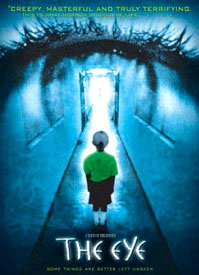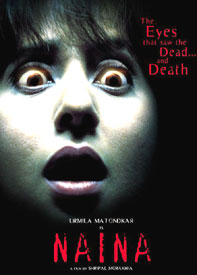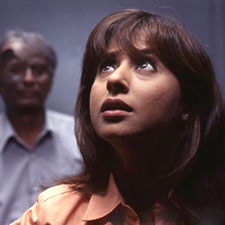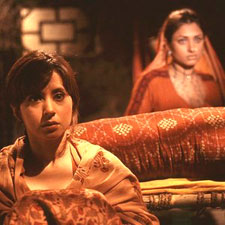 The Eye (Jian gui, 2002) is a Cantonese Hong Kong & Korean co-production of a gui or ghost film, the equivalent of Japanese kaidon. This one's about a blind girl who gets a cornea transplant -- & the cornea's previous owner's ghost comes with it.
The Eye (Jian gui, 2002) is a Cantonese Hong Kong & Korean co-production of a gui or ghost film, the equivalent of Japanese kaidon. This one's about a blind girl who gets a cornea transplant -- & the cornea's previous owner's ghost comes with it.
It's a serious film with more than a few great moments. Mun (Lee Sin Jee) goes upon a veritable quest to resolve the mystery of the unhappy ghost & free herself of possession.
She discovers a sad tale of persecution & suicide of a girl who could foretell tragedy, but is never believed until it is too late, & comes to be blamed for the very tragedies she tried to warn people to avoid.
From the grave she has one more tragedy to warn her village about -- & it's going to be catastrophic as always before, & also as before, no one will listen.
The climax is perhaps over-the-top for something that is developed more as a "quiet" horror film like The Others (2001) or the films of M. Knight Shamalamadingdong. But ut no one can deny The Eye sure does have a climax. It doesn't bare up to much pondering afterward, as there are a few things about the story that don't convince, but during the ride it's a good ride.
 Naina (2005) is a Hindi remake of 2002's Jian gui, which was also remade in English starring Jessica Alba in 2008. It somewhat resembles another Chinese film, a spoofier take on the same theme, My Left Eye Sees Ghosts (Ngo joh aan gin diy gwai, 2002).
Naina (2005) is a Hindi remake of 2002's Jian gui, which was also remade in English starring Jessica Alba in 2008. It somewhat resembles another Chinese film, a spoofier take on the same theme, My Left Eye Sees Ghosts (Ngo joh aan gin diy gwai, 2002).
In India, it was widely feared this film would make people afraid of cornea transplants. Apparently Indian people can't see a horror film without thinking it is true, after a steady diet of brain-dulling song-and-dance epics out of Bollywood.
Anyone who only watches Indian films for the crappy-ass singing will hate this perfectly pokerfaced horror tale, but anyone afraid there'll be singing in this one too, don't worry, it really is a horror flick.
A stillborn baby comes to life at the exact moment a family gets in a car crash which blinds their own little girl Naina, with shards of glass in her eyes. Her name, by the way, is Hindi for "Eyes," & a common enough girl's name.
The connection between the infant's resurged corpse & Naina's accidents halfway around the world won't be known for twenty years, when Naina is grown (played by Urmila Matondkar) & gets an operation to restore her vision.
 Naina begins experiencing ghosts & seeing visions after her operation. The ghosts are often but not invariably frightening. The visions regard doomful events of the future. Naina begins experiencing ghosts & seeing visions after her operation. The ghosts are often but not invariably frightening. The visions regard doomful events of the future.
Naina's hysteria gets old fast & not acted convincingly enough for us to share her indescriminate fear. Her eleven year old hospital roomate is bald from chemo therapy. She sees Death come for Annie's spirit, & she begins to follow Death around the hospital. When she stops being an hysteric but tries to understand her experience, she's more interesting.
Due to her visions, she is able to find the corpse of a girl who had gone missing. Doctor Samir Patel (Anuj Sawhney) is most unprofessionally courting her though he's her psychiatrist.
He begins to wonder if her experiences might be real. His colleagues reassure him she is mentally ill, & it is difficult to accept that the supernatural, rather than a medical or mental condition, is in play.
 Strangeness increases when Naina realizes the woman she has been seeing in mirrors is not her own reflection. It took a while to realize this because she'd never known what she personally looked like, having grown up blind, but who she sees in the mirror is not the same person other people see when they look at her. Strangeness increases when Naina realizes the woman she has been seeing in mirrors is not her own reflection. It took a while to realize this because she'd never known what she personally looked like, having grown up blind, but who she sees in the mirror is not the same person other people see when they look at her.
The young woman in the mirror is the one whose corneas she now has. With Samir's assistance, they set out for distant Sumibaar where the cornea donor had lived & died.
The Moslem village is not communicative about Khemi (Shweta Konnur). It's clear, however, that they had feared the girl & believed her a witch, thinking her ability to see impending death was a curse that caused the deaths.
As a remake of the Chinese/Korean horror film, the Hindi version up to now has varied considerably from the original. When Samir & Naina reach the Moslem village, however, it more closely parallels the Jian gui.
The flashback of Khemi's life & death are powerful & well acted. Khemi had been loved by no one, threatened with murder, feared by her own mother. Eventually she walked calmly into the river to die.
Her ghost now reenacts the suicide every night. Khemi's mother Somabai lives with guilt & terror, until Naina tries to convince her to try to break the nightly reenactment. Naina is afterward freed of Khemi's spirit, but still possesses the power of Khemi's eyes.
The resolution of Khemi's story is powerful but somewhat ruined by a comparatively weak anti-climax, which exists merely to end the film with a "big" sequence. Still Cassandra-like, no one on the subway train believes Naina that a catastrophe is pending. But if she'd not been such a hysteric I'm sure she could've found a fire alarm & saved some people without first having to convince them she has magic powers.
copyright © by Paghat the Ratgirl
|

